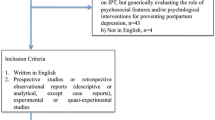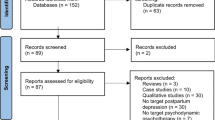Abstract
There is evidence that psychological treatments for postnatal depression are effective in the short-term; however, whether the effects are enduring over time remains an important empirical question. The aim of this study was to investigate the depressive symptoms and interpersonal functioning of participants in a randomised controlled trial (RCT) of group interpersonal psychotherapy (IPT-G) at 2 years posttreatment. The study also examined long-term trajectories, such as whether participants maintained their recovery status, achieved later recovery, recurrence or persistent symptoms. Approximately 2 years posttreatment, all women in the original RCT (N = 50) were invited to participate in a mailed follow-up. A repeated measures analysis of variance assessed differences between the treatment and control conditions on depression and interpersonal scores across five measurement occasions: baseline, mid-treatment, end of treatment and 3-month and 2-year follow-up. Chi-square tests were used to analyse the percentage of participants in the four recovery categories. Mothers who received IPT-G improved more rapidly in the short-term and were less likely to develop persistent depressive symptoms in the long-term. Fifty seven percent of IPT-G mothers maintained their recovery over the follow-up period. Overall, IPT-G participants were significantly less likely to require follow-up treatment. Limitations include the use of self-report questionnaires to classify recovery. The positive finding that fewer women in the group condition experienced a persistent course of depression highlights its possible enduring effects after treatment discontinuation. Further research is needed to improve our long-term management of postnatal depression for individuals who are vulnerable to a recurrent or chronic trajectory.



Similar content being viewed by others
References
Appleby L, Warner R, Whitton A, Faragher B (1997) A controlled study of fluoxetine and cognitive-behavioural counselling in the treatment of postnatal depression. Br Med J 314:932–936
Beck CT, Gable RK (2001) Comparative analysis of the performance of the postpartum depression screening scale with two other depression instruments. Nurs Res 50:242–250
Beck AT, Steer RA, Brown GK (1996) Manual for the Beck Depression Inventory-II, Vol. Psychological Corporation, San Antonio, Psychological Corporation
Boath E, Henshaw C (2001) The treatment of postnatal depression: a comprehensive literature review. J Reprod Infant Psychol 19:215–235
Campbell SB, Cohn JF, Flanagan C, Popper S (1992a) Course and correlates of postpartum depression during the transition to parenthood. Dev Psychopathol 4:29–47
Campbell SB, Cohn JF, Flanagan C, Popper S, Meyers T (1992b) Course and correlates of postpartum depression during the transition to parenthood. Dev Psychopathol 4:29–47
Chen CH, Tseng YF, Chou FH, Wang SY (2000) Effects of support group intervention in postnatally distressed women. A controlled study in Taiwan. J Psychosom Res 49:395–399
Cogill SR, Caplan HL, Alexandra H, Robson KM, Kumar R (1986) Impact of maternal postnatal depression on cognitive development of young children. Br Med J (Clin Res Ed) 292:1165–1167
Cohen LS (1985) Measuring the functional components of social support. In: Sarason IG, Sarason BR (eds) Social support: Theory, research and applications. Martinus Nijhoff Publishers, Dordrecht, pp 73–94
Cooper PJ, Murray L (1995) Course and recurrence of postnatal depression. Evidence for the specificity of the diagnostic concept. Br J Psychiatry 166:191–195
Cooper P, Murray L (1997) Prediction, detection, and treatment of postnatal depression. Arch Dis Child 77:97–99
Cox JL, Holden JM, Sagovsky R (1987) Detection of postnatal depression. Development of the 10-item Edinburgh postnatal depression scale. Br J Psychiatry 150:782–786
Coyne JC, Gotlib IH (1983) The role of cognition in depression—a critical appraisal. Psychol Bull 94:472–505
Craig M, Howard LM (2009) Postnatal depression. Clin Evid (Online) 2009 website: http://clinicalevidence.bmj.com.virtual.anu.edu.au/ceweb/conditions/pac/1407/1407-get.pdf date accessed 6th May, 2009
Cuijpers P, Brannmark JG, Van Straten A (2008) Psychological treatment of postpartum depression: a meta-analysis. J Clin Psychol 64:103–118
Dennis CL (2003) The effect of peer support on postpartum depression: a pilot randomized controlled trial. Can J Psychiatry 48:115–124
Dennis CL (2004) Treatment of postpartum depression, part 2: a critical review of nonbiological interventions. J Clin Psychiatry 65:1252–1265
Dennis CL, Chung-Lee L (2006) Postpartum depression help-seeking barriers and maternal treatment preferences: a qualitative systematic review. Birth 33:323–331
Dennis CL, Hodnett E (2007) Psychosocial and psychological interventions for treating postpartum depression. Cochrane Database Syst Rev:CD006116
Dennis CL, Kingston D (2008) A systematic review of telephone support for women during pregnancy and the early postpartum period. J Obstet Gynecol Neonatal Nurs 37:301–314
Feske U, Shear MK, Anderson B, Cyranowski J, Strassburger M, Matty M, Luther J, Frank E (2001) Comparison of severe life stress in depressed mothers and non-mothers: do children matter? Depress Anxiety 13:109–117
Fisher JR, Feekery CJ, Rowe-Murray HJ (2002) Nature, severity and correlates of psychological distress in women admitted to a private mother-baby unit. J Paediatr Child Health 38:140–145
Frank E, Kupfer DJ, Wagner EF, McEachran AB, Cornes C (1991) Efficacy of interpersonal psychotherapy as a maintenance treatment of recurrent depression. Contributing factors. Arch Gen Psychiatry 48:1053–1059
Goodman JH, Santangelo G (2011) Group treatment for postpartum depression: a systematic review. Arch Womens Ment Health 14:277–293
Hamilton M (1960) A rating scale for depression. J Neurol Neurosurg Psychiatry 23:56–62
Hammen C (2003) Social stress and women's risk for recurrent depression. Arch Womens Ment Health 6:9–13
Honey KL, Bennett P, Morgan M (2002) A brief psycho-educational group intervention for postnatal depression. Br J Clin Psychol 41:405–409
Huck SW (2008) Reading statistics and research: Fifth edition. Pearson Education, New York
Josefsson A, Sydsjo G (2007) A follow-up study of postpartum depressed women: recurrent maternal depressive symptoms and child behavior after four years. Arch Womens Ment Health 10:141–145
Matthey S (2004) Calculating clinically significant change in postnatal depression studies using the Edinburgh postnatal depression scale. J Affect Disord 78:269–272
Matthey S, Barnett B, Ungerer J, Waters B (2000) Paternal and maternal depressed mood during the transition to parenthood. J Affect Disord 60:75–85
McMahon C, Barnett B, Kowalenko N, Tennant C (2005) Psychological factors associated with persistent postnatal depression: past and current relationships, defence styles and the mediating role of insecure attachment style. J Affect Disord 84:15–24
McMahon C, Trapolini T, Barnett B (2008) Maternal state of mind regarding attachment predicts persistence of postnatal depression in the preschool years. J Affect Disord 107:199–203
Milgrom J, Negri LM, Gemmill AW, McNeil M, Martin PR (2005) A randomized controlled trial of psychological interventions for postnatal depression. Br J Clin Psych 44:529–542
Millon T, Davis R, Millon C (1997) Millon clinical multiaxial inventory-III (MCMI-III) manual, 2nd edn. NCS Pearson Inc, Minneapolis
Mulcahy R, Reay RE, Wilkinson RB, Owen C (2010) A randomised control trial for the effectiveness of group interpersonal psychotherapy for postnatal depression. Arch Womens Ment Health 13:125–139
Muller ME (1994) A questionnaire to measure mother–infant interaction. J Nurs Meas 2:129–141
Nylen KJ, O'Hara MW, Brock R, Moel J, Gorman L, Stuart S (2010) Predictors of the longitudinal course of postpartum depression following interpersonal psychotherapy. J Consult Clin Psychol 78:757–63
O'Hara MW, Neunaber DJ, Zekoski EM (1984) Prospective study of postpartum depression: prevalence, course, and predictive factors. J Abnorm Psychol 93:158–171
Patel V, Rodrigues M, DeSouza N (2002) Gender, poverty, and postnatal depression: a study of mothers in Goa, India. Am J Psychiatry 159:43–47
Pearlstein T (2008) Perinatal depression: treatment options and dilemmas. J Psychiatry Neuroscience 33:302–318
Pearlstein TB, Zlotnick C, Battle CL, Stuart S, O'Hara MW, Price AB, Grause MA, Howard M (2006) Patient choice of treatment for postpartum depression: a pilot study. Arch Womens Ment Health 9:303–308
Reay R, Matthey S, Ellwood D, Scott PM (2011) Long-term outcomes of participants in a perinatal depression screening program. J Affect Disord 129:94–103
Reay RE, Mulcahy R, Wilkinson RB, Owen C, Shadbolt B, Raphael B (2012) The development and content of an interpersonal psychotherapy group for postnatal depression. Int J Group Psychother 62:221–251
Shapiro DA, Rees A, Barkham M, Hardy G, Reynolds S, Startup M (1995) Effects of treatment duration and severity of depression on the maintenance of gains after cognitive-behavioral and psychodynamic-interpersonal psychotherapy. J Consult Clin Psychol 63:378–387
Spanier G (1976) Measuring dyadic adjustment: new scales for assessing the quality of marriage and similar dyads. J Marriage Fam 38:15–28
Stuart S, Robertson M (2003) Interpersonal psychotherapy: A clinician's guide. Oxford University Press, New York
Viinamaki H, Niskanen L, Pesonen P, Saarikoski S (1997) Evolution of postpartum mental health. J Psychosom Obstet Gynecol 18:213–219
Williams JB (1988) A structured interview guide for the Hamilton depression rating scale. Arch Gen Psychiatry 45:742–747
Wisner KL, Parry BL, Piontek CM (2002) Clinical practice. Postpartum depression. N Engl J Med 347:194–9
Wisner KL, Perel JM, Peindl KS, Hanusa BH (2004) Timing of depression recurrence in the first year after birth. J Affect Disord 78:249–52
Author information
Authors and Affiliations
Corresponding author
Rights and permissions
About this article
Cite this article
Reay, R.E., Owen, C., Shadbolt, B. et al. Trajectories of long-term outcomes for postnatally depressed mothers treated with group interpersonal psychotherapy. Arch Womens Ment Health 15, 217–228 (2012). https://doi.org/10.1007/s00737-012-0280-4
Received:
Accepted:
Published:
Issue Date:
DOI: https://doi.org/10.1007/s00737-012-0280-4




